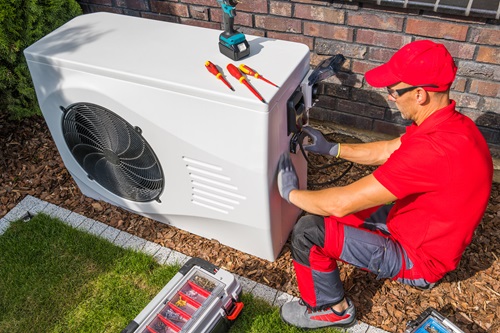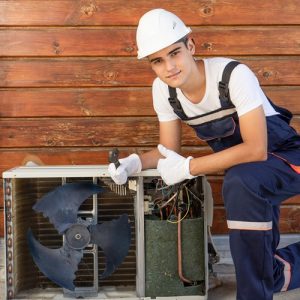
When it comes to choosing a cooling system for your home, you might be torn between central air conditioning systems and heat pumps. Each system offers unique benefits and potential drawbacks, especially in terms of maintenance and repair needs. Understanding these differences can help you make an informed decision that ensures comfort and efficiency for years to come.
How Heat Pumps and Central AC Systems Work
Both heat pumps and central air conditioning systems use similar technology to cool your home. They operate by compressing refrigerant and consist of indoor and outdoor units. The key difference between the two lies in the heat pump’s ability to reverse the flow of refrigerant, allowing it to provide both heating and cooling. This reversing valve is a crucial component, as it enables the heat pump to offer year-round climate control.
The Impact of the Reversing Valve
The reversing valve in a heat pump can occasionally fail due to wear and tear. However, regular maintenance can mitigate this risk. It’s essential to have this valve inspected and serviced twice a year to prevent any issues. For homeowners who use ducted or ductless heat pumps, keeping up with these maintenance schedules is critical to ensure consistent performance.
Factors Influencing Repair Needs
Several factors influence the repair needs of both central air conditioning systems and heat pumps in Knoxville TN:
- Proper Sizing and Installation: Proper installation is crucial. A system that is too large or too small for your home can lead to inefficiencies and increased wear and tear, necessitating more frequent repairs.
- Maintenance Practices: Regularly changing the air filter every 1-3 months is necessary for both systems. For ductless heat pumps, it’s important to clean the filters in each air handler, especially if you have multiple units.
- Usage Patterns: Heat pumps, which operate year-round, may require more frequent maintenance compared to central AC systems, which are typically used only during warmer months.
Tips for Minimizing Repairs and Extending Lifespan
To minimize repairs and extend the lifespan of your cooling system, adhere to the following tips:
- Regular Maintenance: Schedule maintenance for heat pumps twice a year, given their dual role in heating and cooling. Central AC systems should be serviced annually before the cooling season begins.
- Prompt Attention to Issues: Address any signs of trouble, such as unusual noises or reduced cooling efficiency, promptly. Early intervention can prevent minor problems from becoming major repairs.
- Optimal Usage: Avoid overworking your system. Set your thermostat to a comfortable but moderate temperature to reduce strain on the unit.
 Evaluating Energy Efficiency
Evaluating Energy Efficiency
Energy efficiency is a crucial consideration when choosing between central AC and heat pumps. Heat pumps are generally more energy-efficient as they transfer heat rather than generate it, leading to lower energy bills, particularly in milder climates. Central air conditioning systems, while effective at cooling, may not offer the same level of efficiency in energy consumption.
Assessing Lifespan
The lifespan of both central air conditioning systems and heat pumps typically ranges from 10 to 15 years. However, this can vary based on factors such as usage intensity, maintenance regularity, and environmental conditions. Regular servicing and timely repairs can significantly enhance the longevity of both systems.
Overall Performance
Heat pumps provide the benefit of year-round climate control, making them a versatile option for many homeowners. This dual functionality can be particularly advantageous in regions with moderate climates. Central AC systems, on the other hand, are dedicated to cooling and are often paired with separate heating systems, to provide comprehensive climate control.
Making the Right Choice for Your Home
When deciding between central air conditioning and heat pumps, consider your specific needs and circumstances. Factors such as the size of your home, your climate, energy efficiency goals, and budget should all play a role in your decision-making process.
Climate Considerations: In regions with moderate climates, heat pumps may offer superior efficiency and convenience by providing both heating and cooling. In contrast, in areas with extreme temperatures, a combination of central AC and a robust heating system might be more effective.
Energy Efficiency Goals: If reducing energy consumption is a priority, a heat pump’s ability to transfer heat rather than generate it can result in significant energy savings.
Budget and Long-Term Costs: While heat pumps can be more expensive upfront, their energy efficiency can lead to cost savings over time. Consider the total cost of ownership, including installation, maintenance, and energy costs, when making your decision.
Choosing between central air conditioning systems and heat pumps involves weighing various factors, including repair needs, energy efficiency, lifespan, and overall performance. Both systems have their merits, and the best choice depends on your specific requirements and circumstances.
Remember, regular maintenance is crucial to ensure the longevity and efficiency of whichever system you choose. If you encounter any issues with your cooling system, seeking professional assistance from J.C.’s Heating and Air promptly can prevent minor problems from escalating into major repairs.
Are you ready to decide on the best cooling system for your home? Contact J.C.’s Heating and Air today for expert advice and ensure your home stays comfortable year-round!
Like our Facebook page for more great info about heating and cooling services.
Areas Served: Corryton, Fountain City, Halls Crossroads, Farragut, Powell, Knoxville, Knox County, Oak Ridge, Lenoir City
